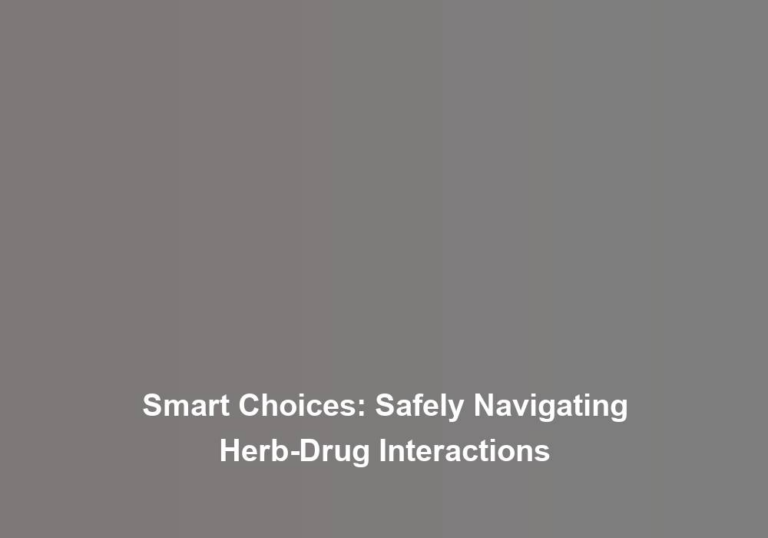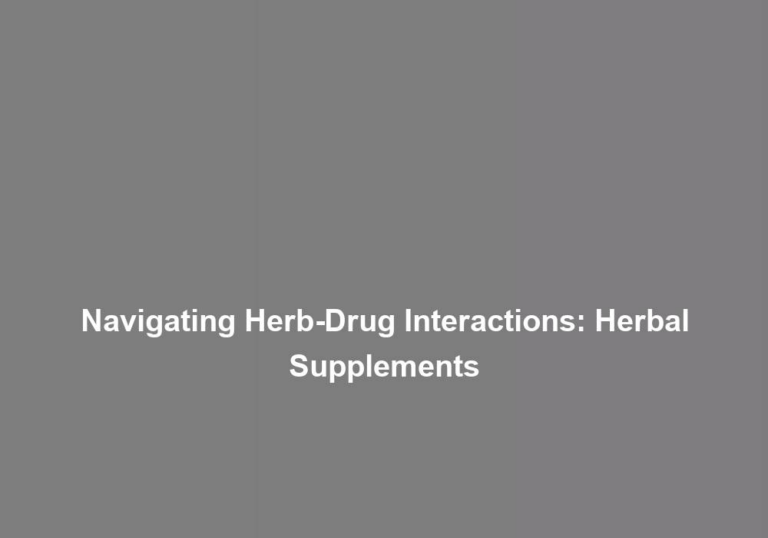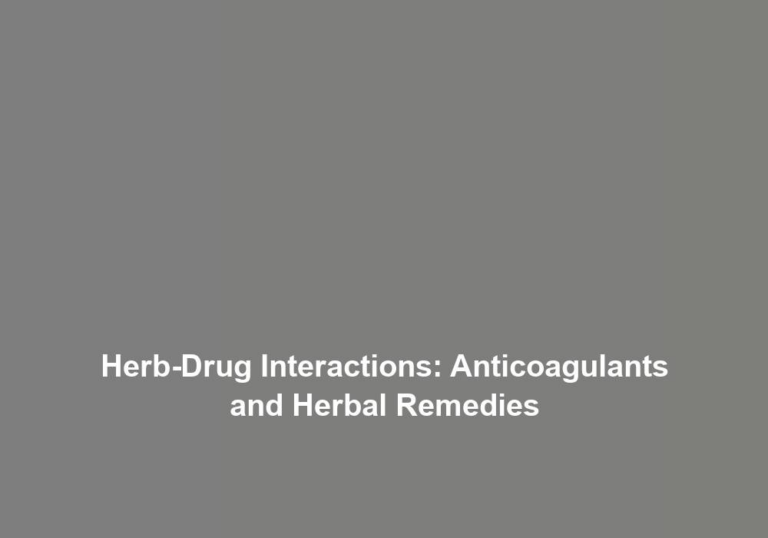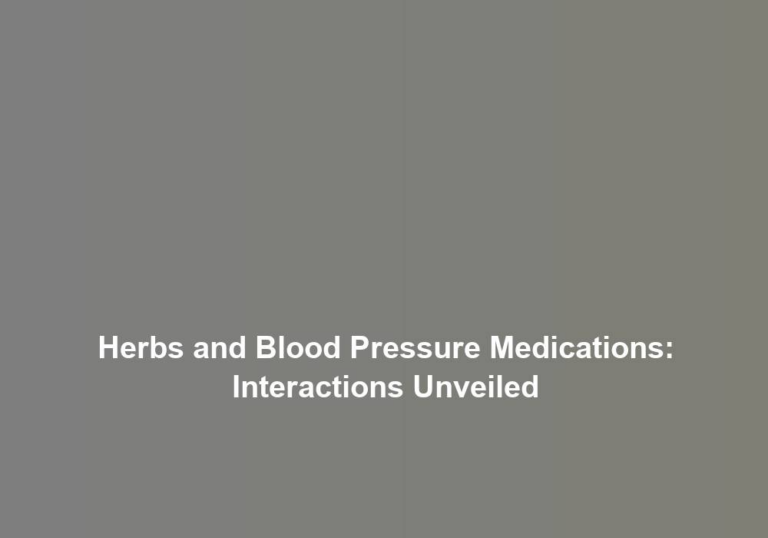Navigating Herb-Drug Interactions: Herbs and Blood Pressure Medications
YouG??ve probably heard the saying G??You are what you eat,G?? but when it comes to managing your blood pressure and medications, itG??s essential to be mindful of what you consume. Herb-drug interactions can have significant implications for individuals taking blood pressure medications, and understanding how herbs can impact these medications is crucial for your health. As you navigate the complex world of herb-drug interactions, itG??s important to be aware of the potential risks and how to manage them effectively. So, how exactly do herbs interact with blood pressure medications, and what steps can you take to ensure your well-being?
Understanding Herb-Drug Interactions
When considering herb-drug interactions, it is crucial to understand the potential impact of combining herbs with prescription medications, particularly regarding their effects on the bodyG??s response to treatment for various health conditions. Herbal supplements have gained popularity as alternative or complementary treatments for a wide range of health issues. However, it is important to recognize that these natural remedies can interact with prescription medications, leading to potential health risks. Understanding drug interactions is essential, as it can affect the efficacy and safety of both the herb and the prescription medication.
Certain herbal supplements can interfere with the way prescription drugs are metabolized in the body. For example, St.-?JohnG??s wort, commonly used to alleviate symptoms of depression, can speed up the breakdown of certain medications, leading to reduced drug levels in the body. Conversely, some herbs may inhibit the bodyG??s ability to metabolize drugs, causing an accumulation of the medication to potentially harmful levels. These interactions can impact the effectiveness of blood pressure medications, leading to fluctuations in blood pressure levels and potentially compromising the treatment of hypertension.
It is crucial to consult healthcare professionals when considering the use of herbal supplements alongside prescription medications. Pharmacists and doctors can provide valuable insights into potential herb-drug interactions, ensuring the safe and effective use of both herbal remedies and prescription medications. By understanding the complexities of herb-drug interactions, individuals can make informed decisions regarding their health and well-being.
Common Herbs Affecting Blood Pressure
Understanding herb-drug interactions is essential, especially when considering the impact of common herbs on blood pressure, as these natural remedies can potentially affect the efficacy and safety of blood pressure medications. When it comes to managing hypertension, certain herbal remedies have been found to influence cardiovascular health and may interact with blood pressure medications. For instance, garlic is a widely used herb for various health benefits, including its potential to lower blood pressure. However, when taken with blood pressure medications, it can cause further reductions in blood pressure, leading to potential complications. Similarly, ginger, often used for its anti-inflammatory properties, may also lower blood pressure and interfere with the effects of blood pressure medications.
On the other hand, itG??s important to note that some herbal remedies, such as Hawthorn, may have complementary effects when used alongside conventional blood pressure medications. Hawthorn has been traditionally used to support heart health and manage blood pressure. When used under proper medical supervision, it may enhance the effects of certain blood pressure medications, promoting better hypertension management.
Risks of Herb-Drug Interactions
Be aware that herb-drug interactions can pose significant risks to your health and the effectiveness of your medications. Identifying risks associated with herb-drug interactions is crucial for optimizing your treatment outcomes. One potential consequence of herb-drug interactions is the alteration of drug levels in your body. Certain herbs may interfere with the metabolism of medications, leading to either reduced drug levels, which can result in ineffective treatment, or increased drug levels, potentially causing toxic effects. For example, the herb St.-?JohnG??s wort has been shown to decrease the blood levels of several medications, including certain blood pressure medications, antidepressants, and oral contraceptives, thereby reducing their effectiveness.
Another risk to consider is the potential for additive effects or adverse reactions when herbs are combined with blood pressure medications. Some herbs, such as ginseng and licorice, have been associated with raising blood pressure, which could counteract the effects of blood pressure medications. Additionally, certain herbs may have blood-thinning properties that can interact with antiplatelet or anticoagulant medications, leading to an increased risk of bleeding.
Moreover, the lack of regulation and standardization in the production of herbal products introduces further risks. The potency and purity of herbal supplements can vary between brands and batches, making it challenging to predict their interactions with blood pressure medications accurately.
Understanding these potential risks is essential for making informed decisions about using herbal products alongside blood pressure medications. Always consult with your healthcare provider before incorporating any herbs into your treatment regimen to minimize the risks of herb-drug interactions.
Managing Interactions Safely
To manage herb-drug interactions safely, it is crucial to be proactive in discussing any potential use of herbal products with your healthcare provider to ensure the effectiveness of your blood pressure medications and minimize associated risks. Safe practices involve open communication with your healthcare provider about any herbal products you are considering using. This ensures that your healthcare provider can provide personalized advice, taking into account your specific health conditions and the medications you are currently taking. Your healthcare provider can also monitor your progress closely, looking for any signs of herb-drug interactions and making adjustments as necessary to keep your blood pressure under control.
Monitoring progress is essential when managing herb-drug interactions. Regular check-ins with your healthcare provider can help to identify any potential issues early on. It is important to keep track of your blood pressure readings, any symptoms you may experience, and any changes in your overall health. By doing so, you and your healthcare provider can work together to ensure that your herbal products and blood pressure medications are working effectively without causing any adverse effects. In case you experience any unusual symptoms, it is important to seek immediate medical attention and inform your healthcare provider about any herbal products you have been using.
Herb-Drug Interaction Prevention
When considering the prevention of herb-drug interactions, it is essential to be well-informed about the potential risks and benefits associated with the concurrent use of herbs and blood pressure medications. To prevent interactions and ensure your safety, it is important to take the following precautions:
-
Consult a Healthcare Professional: Before starting any herbal remedy, consult with your healthcare provider, especially if you are taking blood pressure medications. They can provide personalized advice based on your specific health condition and medication regimen. Additionally, they can help monitor your progress and adjust your treatment plan as needed.
-
Research Herb-Drug Interactions: Stay informed about potential herb-drug interactions by researching credible sources. Websites like the National Center for Complementary and Integrative Health (NCCIH) and the American Botanical Council provide valuable information on herb-drug interactions and precautions. Understanding potential risks can help you make informed decisions about using herbs alongside your blood pressure medications.
Conclusion
In conclusion, itG??s important to tread carefully when combining herbs and blood pressure medications. Keep your eyes peeled for any potential interactions, and always consult with a healthcare professional before adding new herbs to your regimen. Remember, an ounce of prevention is worth a pound of cure, so take the time to educate yourself and make informed choices to keep your health in check. Stay informed, stay safe, and keep those blood pressure levels in check!






